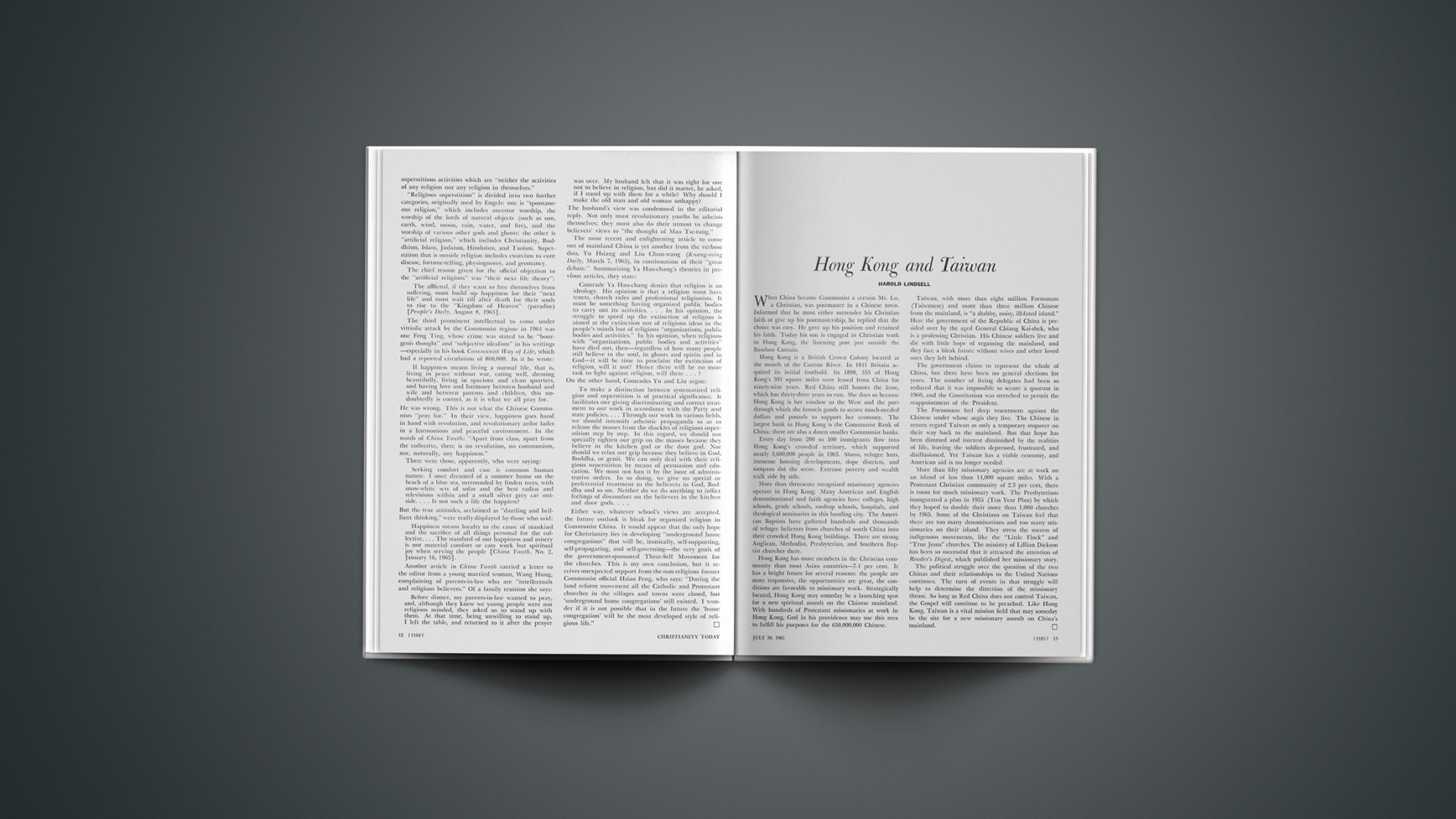When China became Communist a certain Mr. Lu, a Christian, was postmaster in a Chinese town. Informed that he must either surrender his Christian faith or give up his postmastership, he replied that the choice was easy. He gave up his position and retained his faith. Today his son is engaged in Christian work in Hong Kong, the listening post just outside the Bamboo Curtain.
Hong Kong is a British Crown Colony located at the mouth of the Canton River. In 1841 Britain acquired its initial foothold. In 1898, 355 of Hong Kong’s 391 square miles were leased from China for ninety-nine years. Red China still honors the lease, which has thirty-three years to run. She does so because Hong Kong is her window to the West and the port through which she funnels goods to secure much-needed dollars and pounds to support her economy. The largest bank in Hong Kong is the Communist Bank of China; there are also a dozen smaller Communist banks.
Every day from 200 to 500 immigrants flow into Hong Kong’s crowded territory, which supported nearly 3,600,000 people in 1963. Slums, refugee huts, immense housing developments, dope districts, and sampans dot the scene. Extreme poverty and wealth walk side by side.
More than threescore recognized missionary agencies operate in Hong Kong. Many American and English denominational and faith agencies have colleges, high schools, grade schools, rooftop schools, hospitals, and theological seminaries in this bustling city. The American Baptists have gathered hundreds and thousands of refugee believers from churches of south China into their crowded Hong Kong buildings. There are strong Anglican, Methodist, Presbyterian, and Southern Baptist churches there.
Hong Kong has more members in the Christian community than most Asian countries—7.4 per cent. It has a bright future for several reasons: the people are more responsive, the opportunities are great, the conditions are favorable to missionary work. Strategically located, Hong Kong may someday be a launching spot for a new spiritual assault on the Chinese mainland. With hundreds of Protestant missionaries at work in Hong Kong, God in his providence may use this area to fulfill his purposes for the 650,000,000 Chinese.
Taiwan, with more than eight million Formosans (Taiwanese) and more than three million Chinese from the mainland, is “a shabby, noisy, ill-fated island.” Here the government of the Republic of China is presided over by the aged General Chiang Kai-shek, who is a professing Christian. His Chinese soldiers live and die with little hope of regaining the mainland, and they face a bleak future without wives and other loved ones they left behind.
The government claims to represent the whole of China, but there have been no general elections for years. The number of living delegates had been so reduced that it was impossible to secure a quorum in 1960, and the Constitution was stretched to permit the reappointment of the President.
The Formosans feel deep resentment against the Chinese under whose aegis they live. The Chinese in return regard Taiwan as only a temporary stopover on their way back to the mainland. But that hope has been dimmed and interest diminished by the realities of life, leaving the soldiers depressed, frustrated, and disillusioned. Yet Taiwan has a viable economy, and American aid is no longer needed.
More than fifty missionary agencies are at work on an island of less than 14,000 square miles. With a Protestant Christian community of 2.3 per cent, there is room for much missionary work. The Presbyterians inaugurated a plan in 1955 (Ten Year Plan) by which they hoped to double their more than 1,000 churches by 1965. Some of the Christians on Taiwan feel that there are too many denominations and too many missionaries on their island. They stress the success of indigenous movements, like the “Little Flock” and “True Jesus” churches. The ministry of Lillian Dickson has been so successful that it attracted the attention of Reader’s Digest, which published her missionary story.
The political struggle over the question of the two Chinas and their relationships to the United Nations continues. The turn of events in that struggle will help to determine the direction of the missionary thrust. So long as Red China does not control Taiwan, the Gospel will continue to be preached. Like Hong Kong, Taiwan is a vital mission field that may someday be the site for a new missionary assault on China’s mainland.










